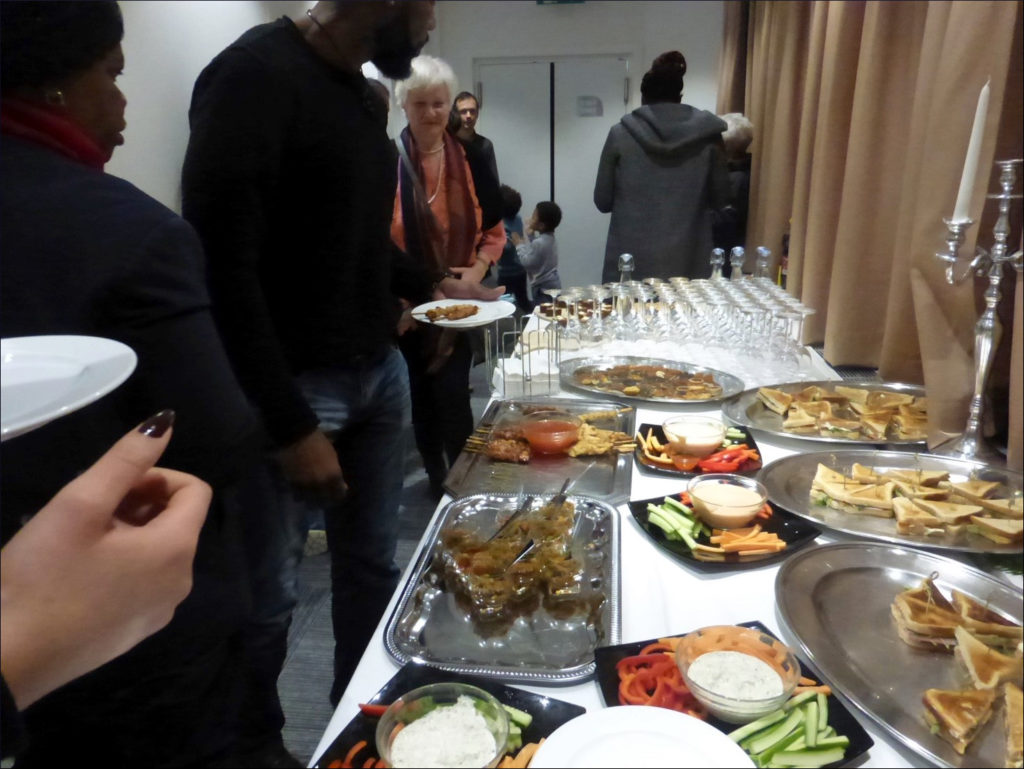Family Festival in Biel
To commemorate the 70th anniversary of the proclamation of the Universal Declaration of Human Rights, the FFWPU-NW community organized a family festival on December 8, 2018 in Biel/Bienne. About 100 people participated in the first hour of artistic presentations including dances, songs and instrumental music. About forty had come to admire their children dance and then left with the little dancers for a drink organized by their dance school.
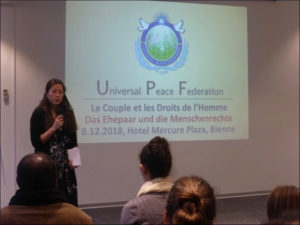
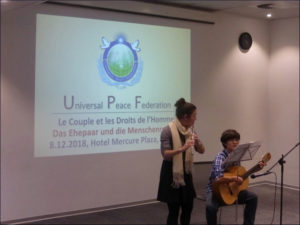
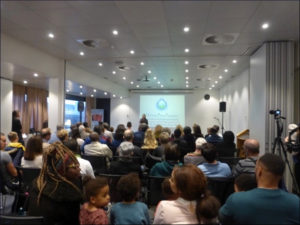
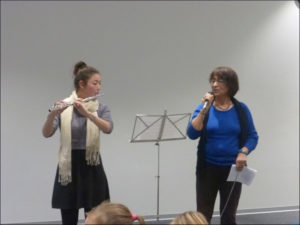
Noëmie Komagata did the moderation in French and German and then went on to simultaneous translation into German during the conference for about one quarter of the participants; all slides were written in both languages.
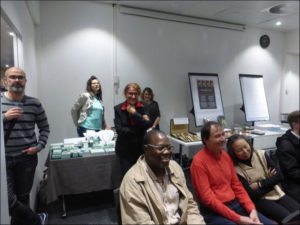
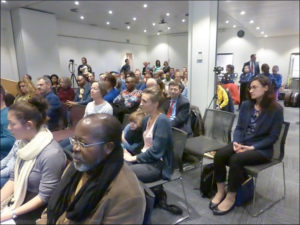
After this first part, Chantal Chételat Komagata, UPF general secretary, started her presentation on the couple and human rights with heartfelt greetings. She mentioned several articles in the UDHR that were specific to the couple and the family, explaining them in the context of the UPF universal principles and her personal experience as a woman, mother, and grandmother. Here is a summary:
Article 1 presents the fundamental rights of human beings: free and equal in dignity and rights, endowed with reason and conscience and should act towards one another in a spirit of brotherhood. All start in the womb, cross life on earth hoping to find joy and happiness and one day, leave it through the death of their bodies; this process makes us automatically equal towards life. The question of equal rights, the development of reason and conscience particularly depends on the family and societal environment in which one grows up, which automatically influences our ability to pursue a goal higher than just the survival, to ensure a spirit of equality and fraternity to all. A family of true love and thus a holistic development of each individual represents the crux about putting this article into practice, which is the key to world peace.
The first point of Article 16, in which the full age for marriage is evoked, particularly surprised the public. It is an expression that cannot be understood without a thorough explanation. The presentation highlights the various essential elements in the physical, spiritual, emotional, intellectual and mental areas in order to allow the person to reach a sufficient degree of maturity before embarking into marriage. It is also mentioned that the family is the natural and fundamental group of society and is entitled to protection and that marriage shall be entered into only with the free and full consent of the intending spouses, which also requires a maturity of mind and conscience of the future spouses.
Article 18 deals with the right to freedom of thought, conscience and religion; this right includes freedom to change his religion or belief, and freedom, either alone or in community with others and in public or private, to manifest his religion or belief in teaching, practice, worship and observance. Article 19 deals with the right to freedom of opinion and expression. These different rights are a great challenge for couples if the husband or wife imposes their own point of view or fixed doctrine, wants to be right and cannot deal with contrary opinions. The only way to make a couple and a family work, is to develop an ear of appreciation for each other, to use any criticism or contrary viewpoint as an opportunity to extend one’s horizon and to develop, particularly when these come from children. In the case of intercultural couples the problem of cultural arrogance adds up to personal differences of opinion.
Article 26 stipulates the right to compulsory and free elementary education and specifies that this education shall be directed to the full development of the human personality and to the strengthening of respect for human rights and fundamental freedoms. It presupposes, therefore, an education, which does not only concern the intellect and knowledge, but the development of the personality in all its dimensions. This seems very far from today’s school systems.
Article 29 mentions the duties to the community and the limitations of one’s rights to ensure due recognition and respect of the rights and freedoms of others and of meeting the just requirements of morality, public order and the general welfare in a democratic society. It is the only article, which, instead of mentioning a right, speaks of a duty and a limit to individual rights. With respect to morals, a rather controversial term in western democratic societies nowadays, it would help to redefine it as it was understood 70 years ago, and reflect on what the family would look like if the morals were still understood in the same way in 2018!
In conclusion, even if these rights remain fully valid today, the implementation of the articles in the context of our modern democratic societies is lacking. School education, which used to be given on the basis of religious, normative and community education should be reviewed as this kind of education is now lacking in many families. Moreover, the mention of morality attracts more anger than respect in a society in which individual behaviors that would have been described as drifts half a century ago are considered normal. Consciousness has adjusted to new norms and allows couples to make choices that suit them best without thinking of the social consequences.
The conference was illustrated with many personal examples of the life of the speaker, particularly in her desire to overcome as many differences as possible with her Japanese husband in order to leave their children substantial advantages to become fully developed individuals and bridges between cultures. They managed to continue their journey thanks to the shared goal of helping to establish a harmonious human family with universal values and virtues that they strived to gradually substantialize in their family of 3 generations.
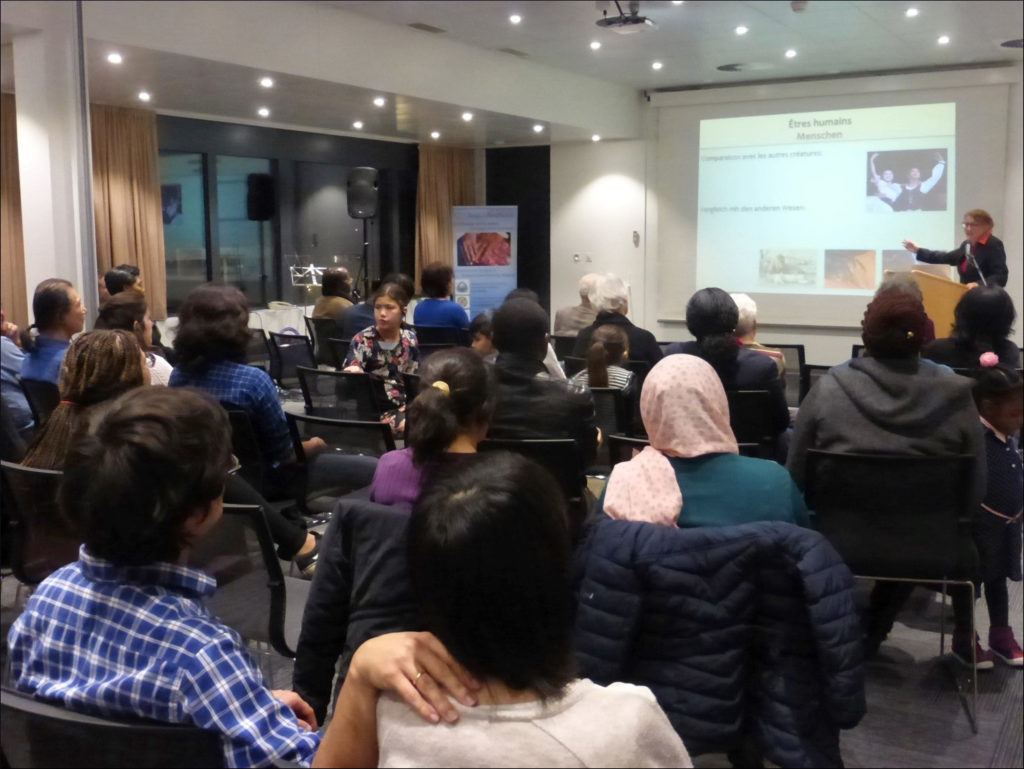
As a symbol of a new start, sacred juice was distributed to the assembly after reading the promises that as individuals, they would maintain their sexual integrity before marriage and that as couples, they would remain faithful to their spouse.
The conference ended with questions and answers. Several people lamented over the inability of many families to sufficiently educate their children and that the right to vote and marry should be limited to mature people, for which no measuring criterion has been established so far. It was also mentioned that many ignore the content of the UDHR and that it should be taught at school. Finally, the question of academic education was put into question and found to need drastic reforms so as to be directed to the full development of the human personality.
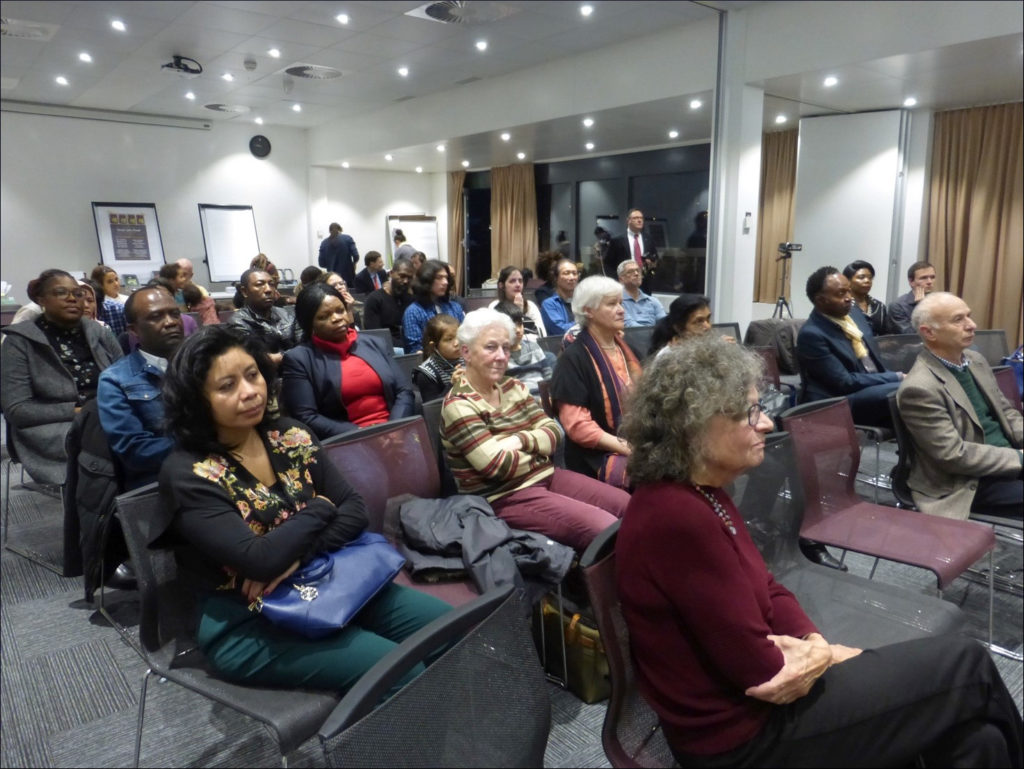
At 6 pm, everyone left their seats and continued to socialize around the various dishes ordered from the hotel as well as sushi, n’dole and donuts prepared by the family and ambassadors of peace.
With the feeling of having reflected on essential topics and having acquired new knowledge, the assembly, composed of many different nations, left the hall bit by bit with a few youths and children.


